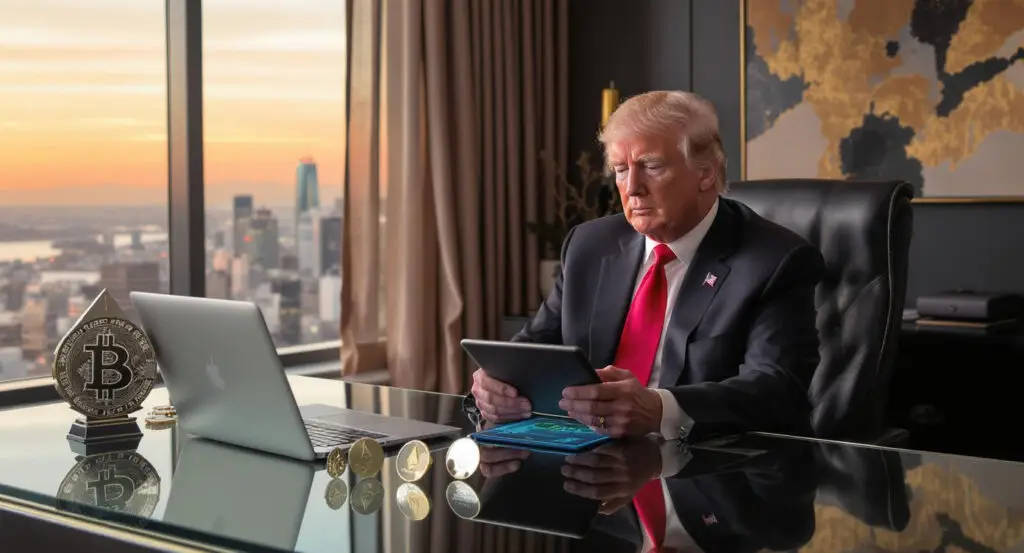The Intersection of Crypto and Political Power
Since his return to the White House, Donald Trump has become a vocal advocate for Bitcoin, pledging to transform the U.S. into the “crypto capital of the world.” His administration’s actions, including appointing pro-crypto regulators to the SEC and signing the landmark GENIUS Act, suggest a clear effort to create a more favorable environment for digital assets.
These policies, while presented for national benefit, also directly align with his personal and business interests. This unique intersection of politics and finance is a key factor in the recent surge of his crypto-related ventures and highlights the complex relationship between political power and the rapidly evolving cryptocurrency market.
The Extent of a Diverse Crypto Portfolio
An analysis of Donald Trump’s involvement in the crypto industry reveals a substantial and multi-faceted portfolio. Recent data indicates his personal crypto wallets hold approximately $430 million in various digital assets. His stake in World Liberty Financial, a crypto company, is valued at $390 million.
The president has also generated an estimated $315 million in revenue from his official meme coin, $TRUMP, a project that saw prices dramatically increase after he hosted a dinner for its biggest holders. Additionally, his non-fungible token (NFT) collection, a series of digital artworks depicting him in various heroic and pop culture roles, has brought in an estimated $6.6 million. These diverse holdings demonstrate his deep financial ties to the digital asset space.
Trump Media’s Bitcoin Treasury Strategy
A major component of Trump’s crypto empire is the Trump Media & Technology Group (TMTG), the parent company of Truth Social, where he is a majority stakeholder. TMTG has adopted a corporate treasury strategy pioneered by firms like Strategy, adding a substantial amount of Bitcoin to its balance sheet.
The company currently holds about 18,430 BTC, valued at approximately $2.1 billion. This strategic move aims to fortify TMTG’s financial freedom, protect it from potential discrimination by traditional financial institutions, and create synergies with a planned utility token for the Truth Social ecosystem. This approach highlights a growing trend among publicly traded companies to use Bitcoin as a reserve asset.
Bitcoin vs. TMTG
Despite TMTG’s significant Bitcoin holdings, its stock, traded as DJT, has consistently underperformed against Bitcoin itself. For example, while Bitcoin experienced a 5% decline in the past week, TMTG’s stock plunged by 11%. Over a six-month period, the contrast is even more pronounced: Bitcoin saw an increase of 10.6%, while TMTG shares plummeted by a staggering 47%.
This underperformance indicates that TMTG’s stock price is influenced by a combination of factors beyond just its Bitcoin treasury. It suggests investor sentiment is also tied to the company’s operational performance, legal challenges, and broader market perception, showcasing a more complex interplay of market forces.
The Indirect Exposure of Bitcoin Treasury Companies
Bitcoin treasury companies have become popular on Wall Street as they allow both retail and institutional investors to gain exposure to digital assets without the complexities of direct ownership. In theory, an increase in Bitcoin’s value should lead to a corresponding rise in the company’s share price. However, TMTG’s performance demonstrates that this relationship is not always direct.
The company’s decision to hold Bitcoin as a reserve asset is a strategic one, aimed at providing financial security and future growth avenues. This model represents a new frontier in corporate finance, where traditional investment vehicles are being used to bridge the gap into the digital asset world.
The Crypto Industry’s Contribution to Political Funding
The crypto industry has emerged as a major financial backer for Trump’s political action committee, MAGA Inc. Deep-pocketed donors from the sector, including executives from Crypto.com and Blockchain.com, as well as the Winklevoss twins, have contributed significant sums.
This financial support underscores the growing influence of the crypto industry in the political landscape, particularly in backing candidates who advocate for favorable regulatory environments. The donations highlight a strategic effort by the crypto sector to shape future legislation and policy that could impact its growth and adoption, demonstrating a clear link between financial support and political advocacy.
Ethical Concerns and Political Scrutiny
The president’s deep ties to the crypto industry have not gone unnoticed, drawing sharp criticism from a variety of sources. Democrats on the House Committee on Financial Services have openly voiced their concerns, pointing to potential ethical and legal conflicts of interest.
The combination of Trump’s personal crypto ventures and his administration’s pro-crypto policies raises questions about whether these actions are truly for the public good or are primarily intended to enrich his own business empire. The ongoing scrutiny highlights the delicate balance between fostering innovation and ensuring transparency and accountability in the highest levels of government.
A New Era of Politicized Finance
Donald Trump’s extensive involvement in the cryptocurrency space, from personal holdings to corporate strategies and political funding, signals a new era where political figures and their financial empires are deeply intertwined with digital assets. His administration’s crypto-friendly policies align closely with his own business interests, creating a complex and sometimes controversial narrative.
Despite his company’s underperformance relative to Bitcoin, the crypto industry’s financial contributions to his political action committee underscore a growing influence. This evolving landscape highlights a future where the world of politics, business, and decentralized finance are increasingly connected, with profound implications for transparency, policy, and market dynamics.
Read more: Trump’s Unfulfilled Peace Promises: Why Wars Escalate























